Analyzing SASOL Limited's Global Business Environment Report
VerifiedAdded on 2020/10/22
|9
|2538
|275
Report
AI Summary
This report provides a comprehensive analysis of SASOL Limited's global business environment. It begins with an introduction to the concept of the global business environment and its influence on organizational operations. The report then delves into a detailed examination of SASOL Limited's structure, culture, and governance, applying McKinsey's 7S model to illustrate the interdependence of various organizational elements. It further explores the influence of Hofstede's cultural dimensions on the company's operations, highlighting the impact of cultural differences. The report also evaluates ethical and sustainable factors relevant to the company's global presence, followed by an analysis of how various factors affect decision-making in a global context. Finally, it assesses the strategic expansion routes taken by the organization, including mergers, acquisitions, and franchising, along with their respective advantages and disadvantages. The report concludes with a summary of the key findings and insights.
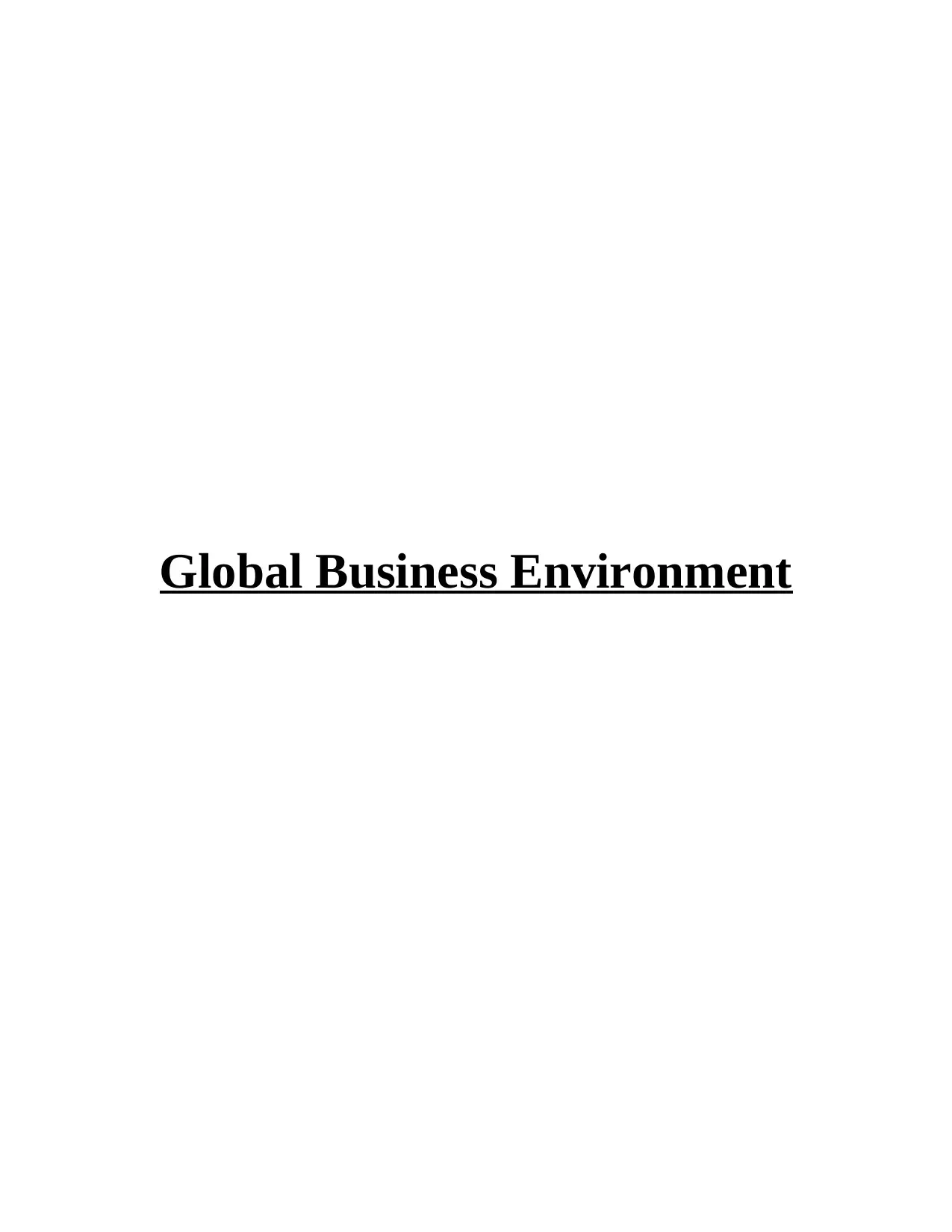
Global Business Environment
Paraphrase This Document
Need a fresh take? Get an instant paraphrase of this document with our AI Paraphraser
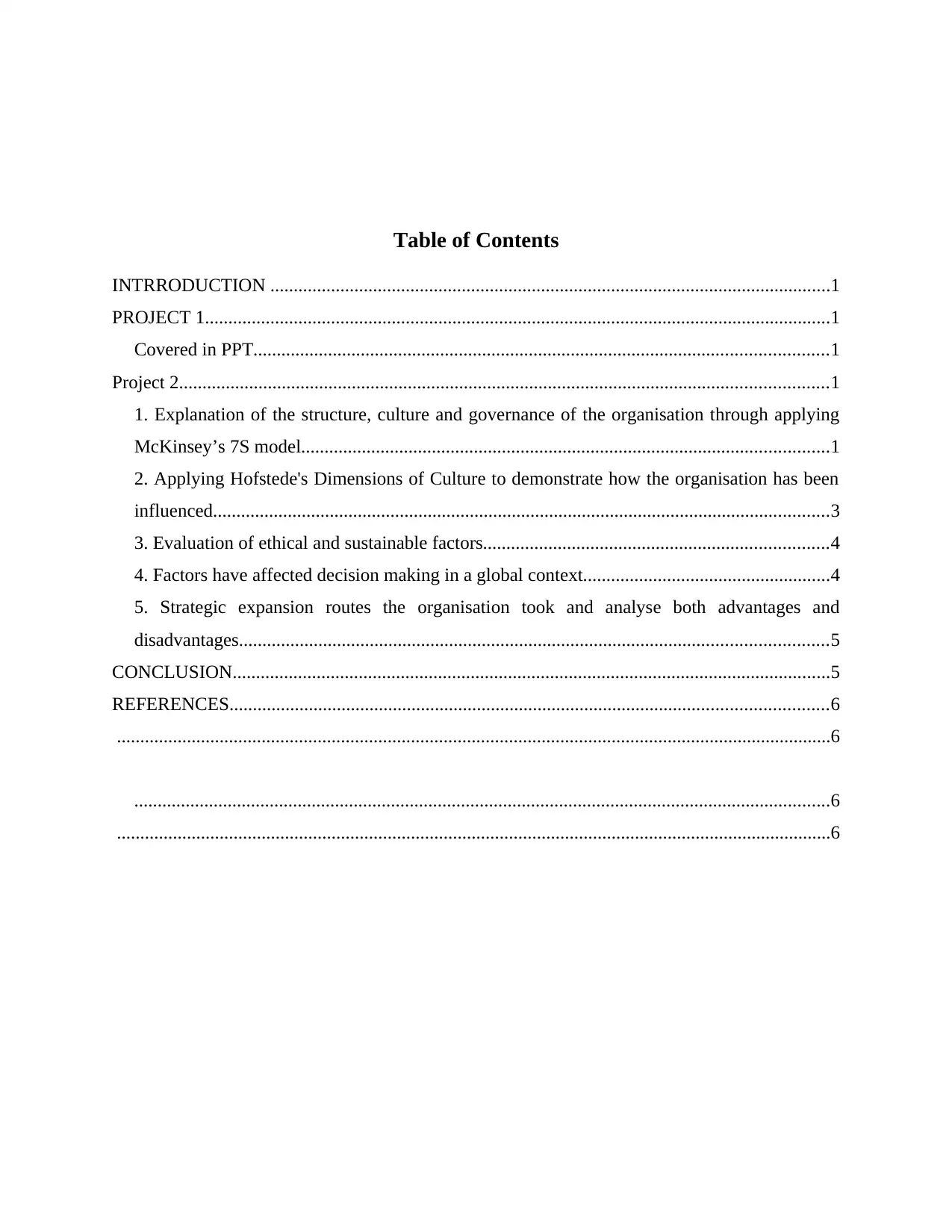
Table of Contents
INTRRODUCTION ........................................................................................................................1
PROJECT 1......................................................................................................................................1
Covered in PPT...........................................................................................................................1
Project 2...........................................................................................................................................1
1. Explanation of the structure, culture and governance of the organisation through applying
McKinsey’s 7S model.................................................................................................................1
2. Applying Hofstede's Dimensions of Culture to demonstrate how the organisation has been
influenced....................................................................................................................................3
3. Evaluation of ethical and sustainable factors..........................................................................4
4. Factors have affected decision making in a global context.....................................................4
5. Strategic expansion routes the organisation took and analyse both advantages and
disadvantages..............................................................................................................................5
CONCLUSION................................................................................................................................5
REFERENCES................................................................................................................................6
.........................................................................................................................................................6
.....................................................................................................................................................6
.........................................................................................................................................................6
INTRRODUCTION ........................................................................................................................1
PROJECT 1......................................................................................................................................1
Covered in PPT...........................................................................................................................1
Project 2...........................................................................................................................................1
1. Explanation of the structure, culture and governance of the organisation through applying
McKinsey’s 7S model.................................................................................................................1
2. Applying Hofstede's Dimensions of Culture to demonstrate how the organisation has been
influenced....................................................................................................................................3
3. Evaluation of ethical and sustainable factors..........................................................................4
4. Factors have affected decision making in a global context.....................................................4
5. Strategic expansion routes the organisation took and analyse both advantages and
disadvantages..............................................................................................................................5
CONCLUSION................................................................................................................................5
REFERENCES................................................................................................................................6
.........................................................................................................................................................6
.....................................................................................................................................................6
.........................................................................................................................................................6

⊘ This is a preview!⊘
Do you want full access?
Subscribe today to unlock all pages.

Trusted by 1+ million students worldwide
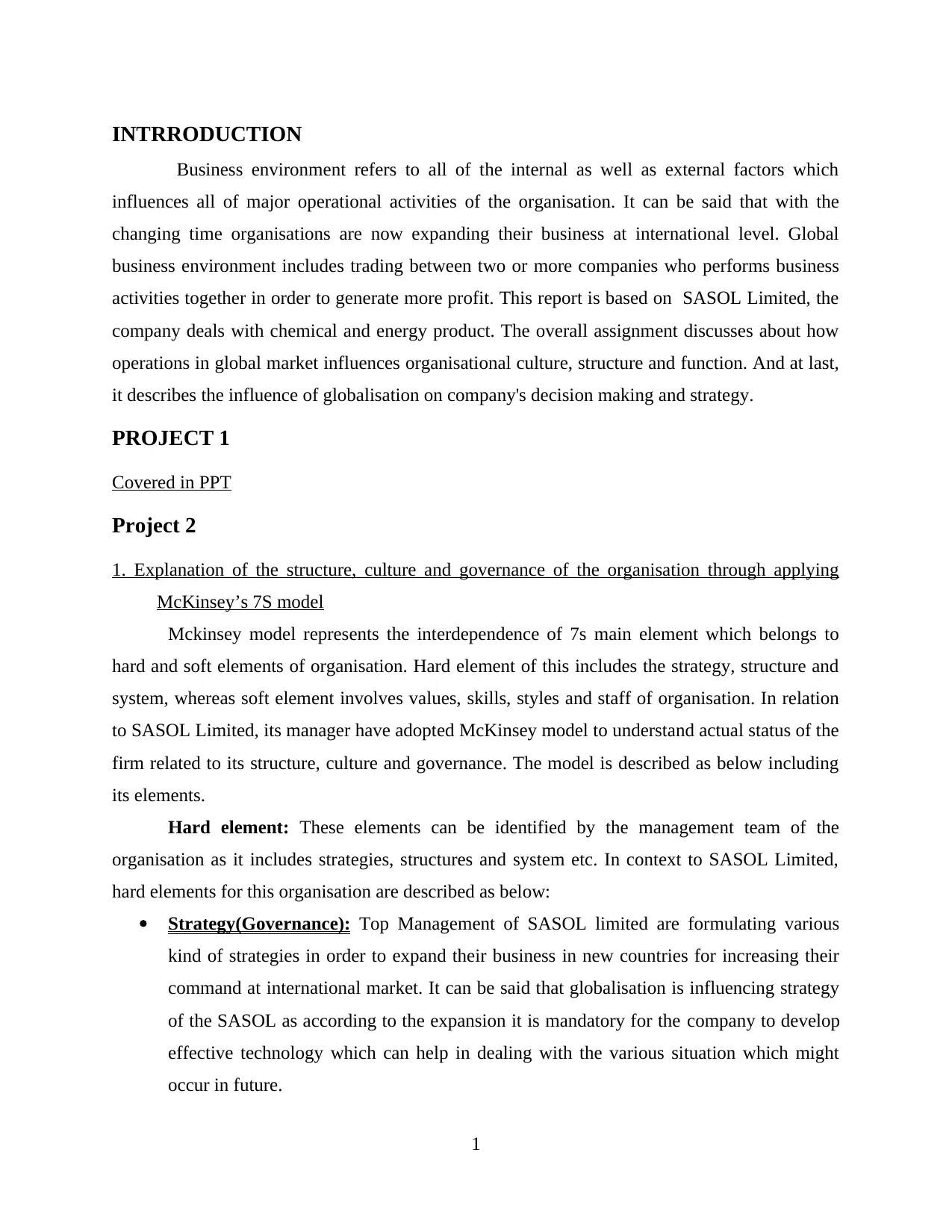
INTRRODUCTION
Business environment refers to all of the internal as well as external factors which
influences all of major operational activities of the organisation. It can be said that with the
changing time organisations are now expanding their business at international level. Global
business environment includes trading between two or more companies who performs business
activities together in order to generate more profit. This report is based on SASOL Limited, the
company deals with chemical and energy product. The overall assignment discusses about how
operations in global market influences organisational culture, structure and function. And at last,
it describes the influence of globalisation on company's decision making and strategy.
PROJECT 1
Covered in PPT
Project 2
1. Explanation of the structure, culture and governance of the organisation through applying
McKinsey’s 7S model
Mckinsey model represents the interdependence of 7s main element which belongs to
hard and soft elements of organisation. Hard element of this includes the strategy, structure and
system, whereas soft element involves values, skills, styles and staff of organisation. In relation
to SASOL Limited, its manager have adopted McKinsey model to understand actual status of the
firm related to its structure, culture and governance. The model is described as below including
its elements.
Hard element: These elements can be identified by the management team of the
organisation as it includes strategies, structures and system etc. In context to SASOL Limited,
hard elements for this organisation are described as below:
Strategy(Governance): Top Management of SASOL limited are formulating various
kind of strategies in order to expand their business in new countries for increasing their
command at international market. It can be said that globalisation is influencing strategy
of the SASOL as according to the expansion it is mandatory for the company to develop
effective technology which can help in dealing with the various situation which might
occur in future.
1
Business environment refers to all of the internal as well as external factors which
influences all of major operational activities of the organisation. It can be said that with the
changing time organisations are now expanding their business at international level. Global
business environment includes trading between two or more companies who performs business
activities together in order to generate more profit. This report is based on SASOL Limited, the
company deals with chemical and energy product. The overall assignment discusses about how
operations in global market influences organisational culture, structure and function. And at last,
it describes the influence of globalisation on company's decision making and strategy.
PROJECT 1
Covered in PPT
Project 2
1. Explanation of the structure, culture and governance of the organisation through applying
McKinsey’s 7S model
Mckinsey model represents the interdependence of 7s main element which belongs to
hard and soft elements of organisation. Hard element of this includes the strategy, structure and
system, whereas soft element involves values, skills, styles and staff of organisation. In relation
to SASOL Limited, its manager have adopted McKinsey model to understand actual status of the
firm related to its structure, culture and governance. The model is described as below including
its elements.
Hard element: These elements can be identified by the management team of the
organisation as it includes strategies, structures and system etc. In context to SASOL Limited,
hard elements for this organisation are described as below:
Strategy(Governance): Top Management of SASOL limited are formulating various
kind of strategies in order to expand their business in new countries for increasing their
command at international market. It can be said that globalisation is influencing strategy
of the SASOL as according to the expansion it is mandatory for the company to develop
effective technology which can help in dealing with the various situation which might
occur in future.
1
Paraphrase This Document
Need a fresh take? Get an instant paraphrase of this document with our AI Paraphraser
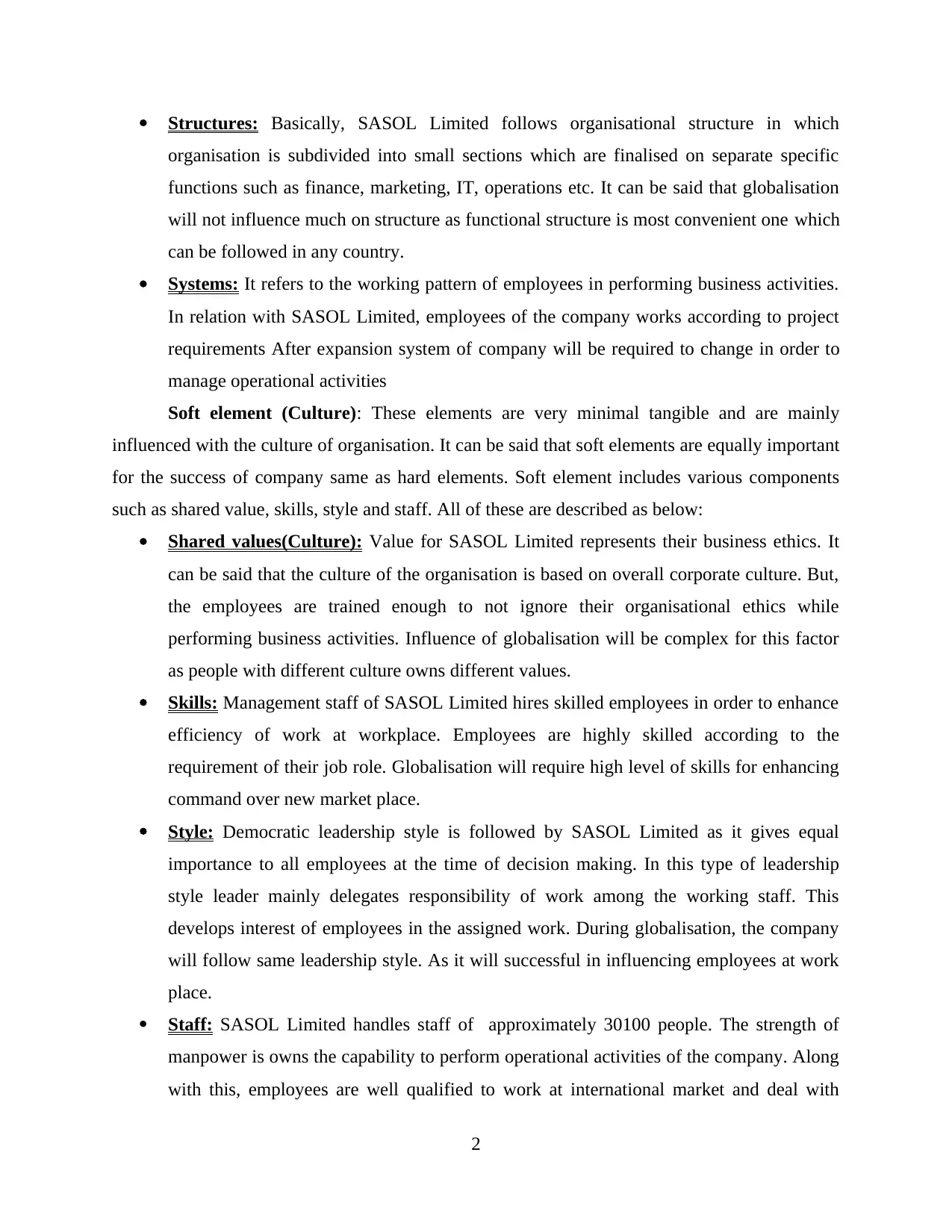
Structures: Basically, SASOL Limited follows organisational structure in which
organisation is subdivided into small sections which are finalised on separate specific
functions such as finance, marketing, IT, operations etc. It can be said that globalisation
will not influence much on structure as functional structure is most convenient one which
can be followed in any country.
Systems: It refers to the working pattern of employees in performing business activities.
In relation with SASOL Limited, employees of the company works according to project
requirements After expansion system of company will be required to change in order to
manage operational activities
Soft element (Culture): These elements are very minimal tangible and are mainly
influenced with the culture of organisation. It can be said that soft elements are equally important
for the success of company same as hard elements. Soft element includes various components
such as shared value, skills, style and staff. All of these are described as below:
Shared values(Culture): Value for SASOL Limited represents their business ethics. It
can be said that the culture of the organisation is based on overall corporate culture. But,
the employees are trained enough to not ignore their organisational ethics while
performing business activities. Influence of globalisation will be complex for this factor
as people with different culture owns different values.
Skills: Management staff of SASOL Limited hires skilled employees in order to enhance
efficiency of work at workplace. Employees are highly skilled according to the
requirement of their job role. Globalisation will require high level of skills for enhancing
command over new market place.
Style: Democratic leadership style is followed by SASOL Limited as it gives equal
importance to all employees at the time of decision making. In this type of leadership
style leader mainly delegates responsibility of work among the working staff. This
develops interest of employees in the assigned work. During globalisation, the company
will follow same leadership style. As it will successful in influencing employees at work
place.
Staff: SASOL Limited handles staff of approximately 30100 people. The strength of
manpower is owns the capability to perform operational activities of the company. Along
with this, employees are well qualified to work at international market and deal with
2
organisation is subdivided into small sections which are finalised on separate specific
functions such as finance, marketing, IT, operations etc. It can be said that globalisation
will not influence much on structure as functional structure is most convenient one which
can be followed in any country.
Systems: It refers to the working pattern of employees in performing business activities.
In relation with SASOL Limited, employees of the company works according to project
requirements After expansion system of company will be required to change in order to
manage operational activities
Soft element (Culture): These elements are very minimal tangible and are mainly
influenced with the culture of organisation. It can be said that soft elements are equally important
for the success of company same as hard elements. Soft element includes various components
such as shared value, skills, style and staff. All of these are described as below:
Shared values(Culture): Value for SASOL Limited represents their business ethics. It
can be said that the culture of the organisation is based on overall corporate culture. But,
the employees are trained enough to not ignore their organisational ethics while
performing business activities. Influence of globalisation will be complex for this factor
as people with different culture owns different values.
Skills: Management staff of SASOL Limited hires skilled employees in order to enhance
efficiency of work at workplace. Employees are highly skilled according to the
requirement of their job role. Globalisation will require high level of skills for enhancing
command over new market place.
Style: Democratic leadership style is followed by SASOL Limited as it gives equal
importance to all employees at the time of decision making. In this type of leadership
style leader mainly delegates responsibility of work among the working staff. This
develops interest of employees in the assigned work. During globalisation, the company
will follow same leadership style. As it will successful in influencing employees at work
place.
Staff: SASOL Limited handles staff of approximately 30100 people. The strength of
manpower is owns the capability to perform operational activities of the company. Along
with this, employees are well qualified to work at international market and deal with
2
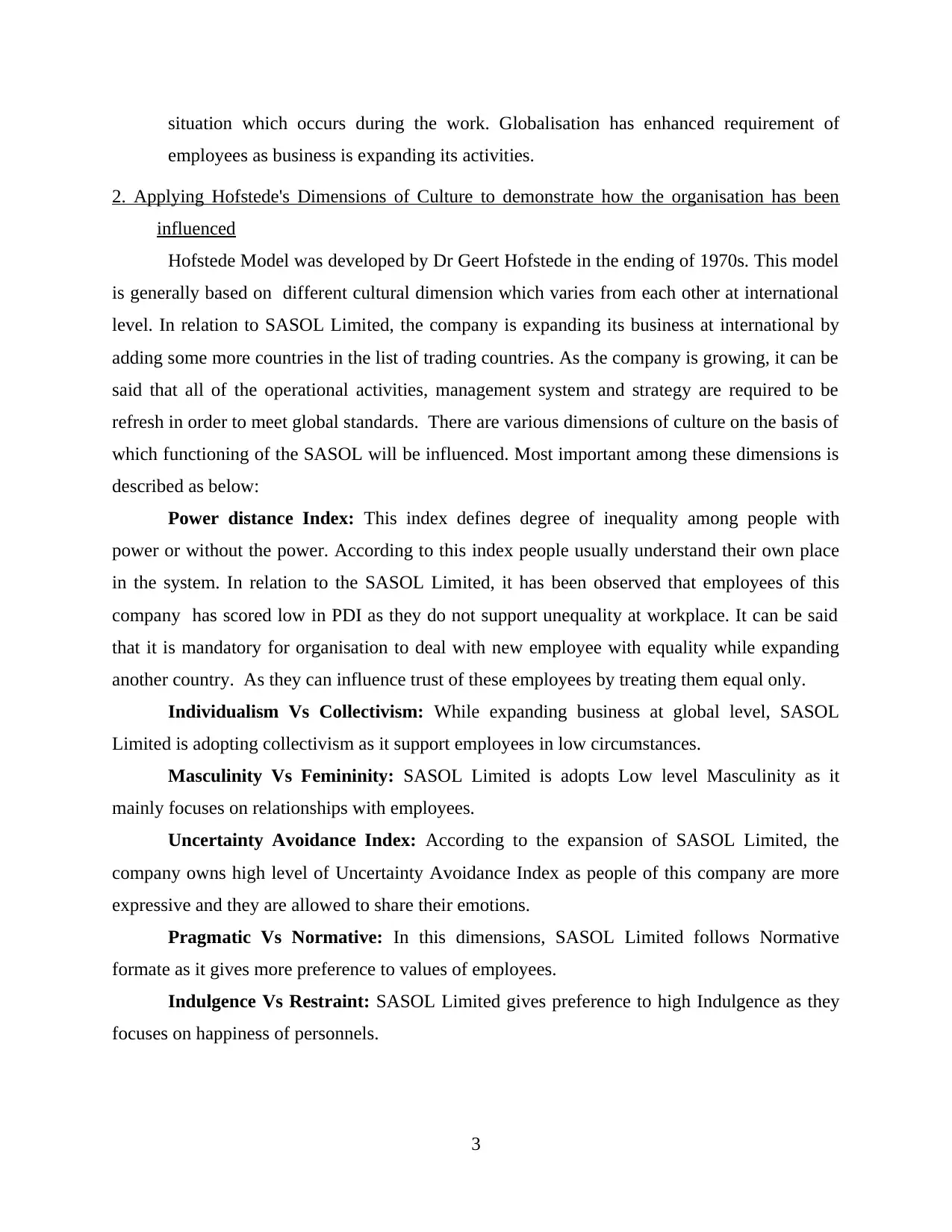
situation which occurs during the work. Globalisation has enhanced requirement of
employees as business is expanding its activities.
2. Applying Hofstede's Dimensions of Culture to demonstrate how the organisation has been
influenced
Hofstede Model was developed by Dr Geert Hofstede in the ending of 1970s. This model
is generally based on different cultural dimension which varies from each other at international
level. In relation to SASOL Limited, the company is expanding its business at international by
adding some more countries in the list of trading countries. As the company is growing, it can be
said that all of the operational activities, management system and strategy are required to be
refresh in order to meet global standards. There are various dimensions of culture on the basis of
which functioning of the SASOL will be influenced. Most important among these dimensions is
described as below:
Power distance Index: This index defines degree of inequality among people with
power or without the power. According to this index people usually understand their own place
in the system. In relation to the SASOL Limited, it has been observed that employees of this
company has scored low in PDI as they do not support unequality at workplace. It can be said
that it is mandatory for organisation to deal with new employee with equality while expanding
another country. As they can influence trust of these employees by treating them equal only.
Individualism Vs Collectivism: While expanding business at global level, SASOL
Limited is adopting collectivism as it support employees in low circumstances.
Masculinity Vs Femininity: SASOL Limited is adopts Low level Masculinity as it
mainly focuses on relationships with employees.
Uncertainty Avoidance Index: According to the expansion of SASOL Limited, the
company owns high level of Uncertainty Avoidance Index as people of this company are more
expressive and they are allowed to share their emotions.
Pragmatic Vs Normative: In this dimensions, SASOL Limited follows Normative
formate as it gives more preference to values of employees.
Indulgence Vs Restraint: SASOL Limited gives preference to high Indulgence as they
focuses on happiness of personnels.
3
employees as business is expanding its activities.
2. Applying Hofstede's Dimensions of Culture to demonstrate how the organisation has been
influenced
Hofstede Model was developed by Dr Geert Hofstede in the ending of 1970s. This model
is generally based on different cultural dimension which varies from each other at international
level. In relation to SASOL Limited, the company is expanding its business at international by
adding some more countries in the list of trading countries. As the company is growing, it can be
said that all of the operational activities, management system and strategy are required to be
refresh in order to meet global standards. There are various dimensions of culture on the basis of
which functioning of the SASOL will be influenced. Most important among these dimensions is
described as below:
Power distance Index: This index defines degree of inequality among people with
power or without the power. According to this index people usually understand their own place
in the system. In relation to the SASOL Limited, it has been observed that employees of this
company has scored low in PDI as they do not support unequality at workplace. It can be said
that it is mandatory for organisation to deal with new employee with equality while expanding
another country. As they can influence trust of these employees by treating them equal only.
Individualism Vs Collectivism: While expanding business at global level, SASOL
Limited is adopting collectivism as it support employees in low circumstances.
Masculinity Vs Femininity: SASOL Limited is adopts Low level Masculinity as it
mainly focuses on relationships with employees.
Uncertainty Avoidance Index: According to the expansion of SASOL Limited, the
company owns high level of Uncertainty Avoidance Index as people of this company are more
expressive and they are allowed to share their emotions.
Pragmatic Vs Normative: In this dimensions, SASOL Limited follows Normative
formate as it gives more preference to values of employees.
Indulgence Vs Restraint: SASOL Limited gives preference to high Indulgence as they
focuses on happiness of personnels.
3
⊘ This is a preview!⊘
Do you want full access?
Subscribe today to unlock all pages.

Trusted by 1+ million students worldwide
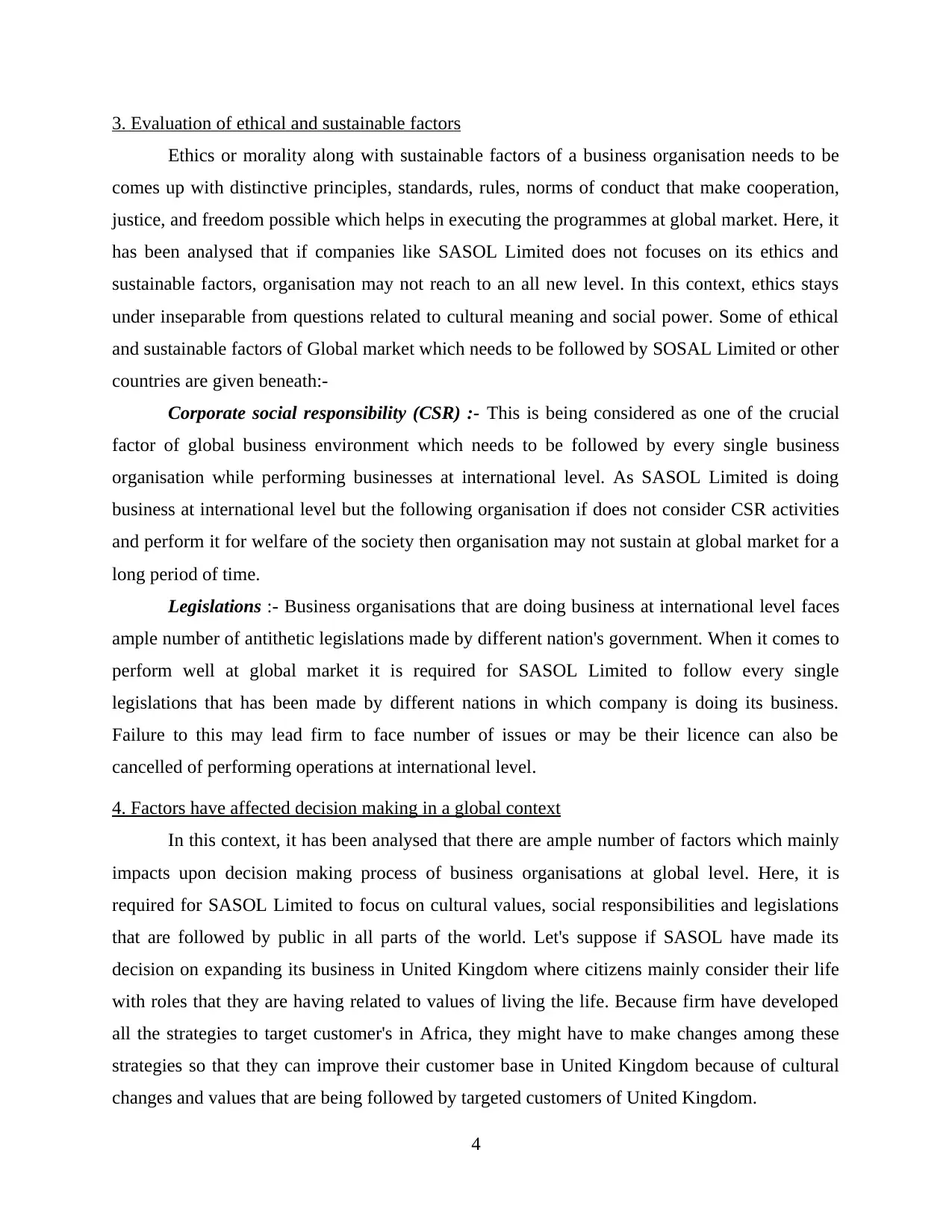
3. Evaluation of ethical and sustainable factors
Ethics or morality along with sustainable factors of a business organisation needs to be
comes up with distinctive principles, standards, rules, norms of conduct that make cooperation,
justice, and freedom possible which helps in executing the programmes at global market. Here, it
has been analysed that if companies like SASOL Limited does not focuses on its ethics and
sustainable factors, organisation may not reach to an all new level. In this context, ethics stays
under inseparable from questions related to cultural meaning and social power. Some of ethical
and sustainable factors of Global market which needs to be followed by SOSAL Limited or other
countries are given beneath:-
Corporate social responsibility (CSR) :- This is being considered as one of the crucial
factor of global business environment which needs to be followed by every single business
organisation while performing businesses at international level. As SASOL Limited is doing
business at international level but the following organisation if does not consider CSR activities
and perform it for welfare of the society then organisation may not sustain at global market for a
long period of time.
Legislations :- Business organisations that are doing business at international level faces
ample number of antithetic legislations made by different nation's government. When it comes to
perform well at global market it is required for SASOL Limited to follow every single
legislations that has been made by different nations in which company is doing its business.
Failure to this may lead firm to face number of issues or may be their licence can also be
cancelled of performing operations at international level.
4. Factors have affected decision making in a global context
In this context, it has been analysed that there are ample number of factors which mainly
impacts upon decision making process of business organisations at global level. Here, it is
required for SASOL Limited to focus on cultural values, social responsibilities and legislations
that are followed by public in all parts of the world. Let's suppose if SASOL have made its
decision on expanding its business in United Kingdom where citizens mainly consider their life
with roles that they are having related to values of living the life. Because firm have developed
all the strategies to target customer's in Africa, they might have to make changes among these
strategies so that they can improve their customer base in United Kingdom because of cultural
changes and values that are being followed by targeted customers of United Kingdom.
4
Ethics or morality along with sustainable factors of a business organisation needs to be
comes up with distinctive principles, standards, rules, norms of conduct that make cooperation,
justice, and freedom possible which helps in executing the programmes at global market. Here, it
has been analysed that if companies like SASOL Limited does not focuses on its ethics and
sustainable factors, organisation may not reach to an all new level. In this context, ethics stays
under inseparable from questions related to cultural meaning and social power. Some of ethical
and sustainable factors of Global market which needs to be followed by SOSAL Limited or other
countries are given beneath:-
Corporate social responsibility (CSR) :- This is being considered as one of the crucial
factor of global business environment which needs to be followed by every single business
organisation while performing businesses at international level. As SASOL Limited is doing
business at international level but the following organisation if does not consider CSR activities
and perform it for welfare of the society then organisation may not sustain at global market for a
long period of time.
Legislations :- Business organisations that are doing business at international level faces
ample number of antithetic legislations made by different nation's government. When it comes to
perform well at global market it is required for SASOL Limited to follow every single
legislations that has been made by different nations in which company is doing its business.
Failure to this may lead firm to face number of issues or may be their licence can also be
cancelled of performing operations at international level.
4. Factors have affected decision making in a global context
In this context, it has been analysed that there are ample number of factors which mainly
impacts upon decision making process of business organisations at global level. Here, it is
required for SASOL Limited to focus on cultural values, social responsibilities and legislations
that are followed by public in all parts of the world. Let's suppose if SASOL have made its
decision on expanding its business in United Kingdom where citizens mainly consider their life
with roles that they are having related to values of living the life. Because firm have developed
all the strategies to target customer's in Africa, they might have to make changes among these
strategies so that they can improve their customer base in United Kingdom because of cultural
changes and values that are being followed by targeted customers of United Kingdom.
4
Paraphrase This Document
Need a fresh take? Get an instant paraphrase of this document with our AI Paraphraser
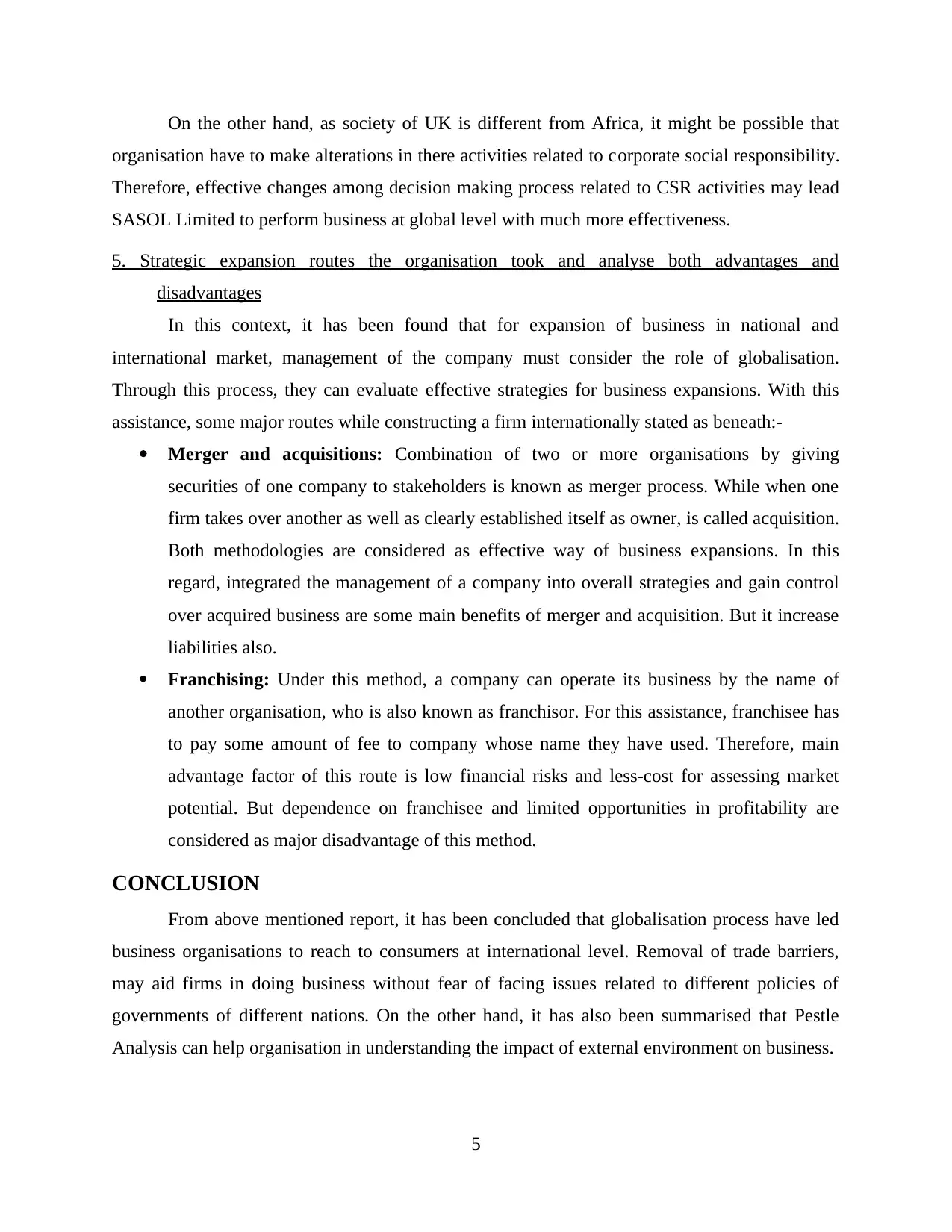
On the other hand, as society of UK is different from Africa, it might be possible that
organisation have to make alterations in there activities related to corporate social responsibility.
Therefore, effective changes among decision making process related to CSR activities may lead
SASOL Limited to perform business at global level with much more effectiveness.
5. Strategic expansion routes the organisation took and analyse both advantages and
disadvantages
In this context, it has been found that for expansion of business in national and
international market, management of the company must consider the role of globalisation.
Through this process, they can evaluate effective strategies for business expansions. With this
assistance, some major routes while constructing a firm internationally stated as beneath:-
Merger and acquisitions: Combination of two or more organisations by giving
securities of one company to stakeholders is known as merger process. While when one
firm takes over another as well as clearly established itself as owner, is called acquisition.
Both methodologies are considered as effective way of business expansions. In this
regard, integrated the management of a company into overall strategies and gain control
over acquired business are some main benefits of merger and acquisition. But it increase
liabilities also.
Franchising: Under this method, a company can operate its business by the name of
another organisation, who is also known as franchisor. For this assistance, franchisee has
to pay some amount of fee to company whose name they have used. Therefore, main
advantage factor of this route is low financial risks and less-cost for assessing market
potential. But dependence on franchisee and limited opportunities in profitability are
considered as major disadvantage of this method.
CONCLUSION
From above mentioned report, it has been concluded that globalisation process have led
business organisations to reach to consumers at international level. Removal of trade barriers,
may aid firms in doing business without fear of facing issues related to different policies of
governments of different nations. On the other hand, it has also been summarised that Pestle
Analysis can help organisation in understanding the impact of external environment on business.
5
organisation have to make alterations in there activities related to corporate social responsibility.
Therefore, effective changes among decision making process related to CSR activities may lead
SASOL Limited to perform business at global level with much more effectiveness.
5. Strategic expansion routes the organisation took and analyse both advantages and
disadvantages
In this context, it has been found that for expansion of business in national and
international market, management of the company must consider the role of globalisation.
Through this process, they can evaluate effective strategies for business expansions. With this
assistance, some major routes while constructing a firm internationally stated as beneath:-
Merger and acquisitions: Combination of two or more organisations by giving
securities of one company to stakeholders is known as merger process. While when one
firm takes over another as well as clearly established itself as owner, is called acquisition.
Both methodologies are considered as effective way of business expansions. In this
regard, integrated the management of a company into overall strategies and gain control
over acquired business are some main benefits of merger and acquisition. But it increase
liabilities also.
Franchising: Under this method, a company can operate its business by the name of
another organisation, who is also known as franchisor. For this assistance, franchisee has
to pay some amount of fee to company whose name they have used. Therefore, main
advantage factor of this route is low financial risks and less-cost for assessing market
potential. But dependence on franchisee and limited opportunities in profitability are
considered as major disadvantage of this method.
CONCLUSION
From above mentioned report, it has been concluded that globalisation process have led
business organisations to reach to consumers at international level. Removal of trade barriers,
may aid firms in doing business without fear of facing issues related to different policies of
governments of different nations. On the other hand, it has also been summarised that Pestle
Analysis can help organisation in understanding the impact of external environment on business.
5
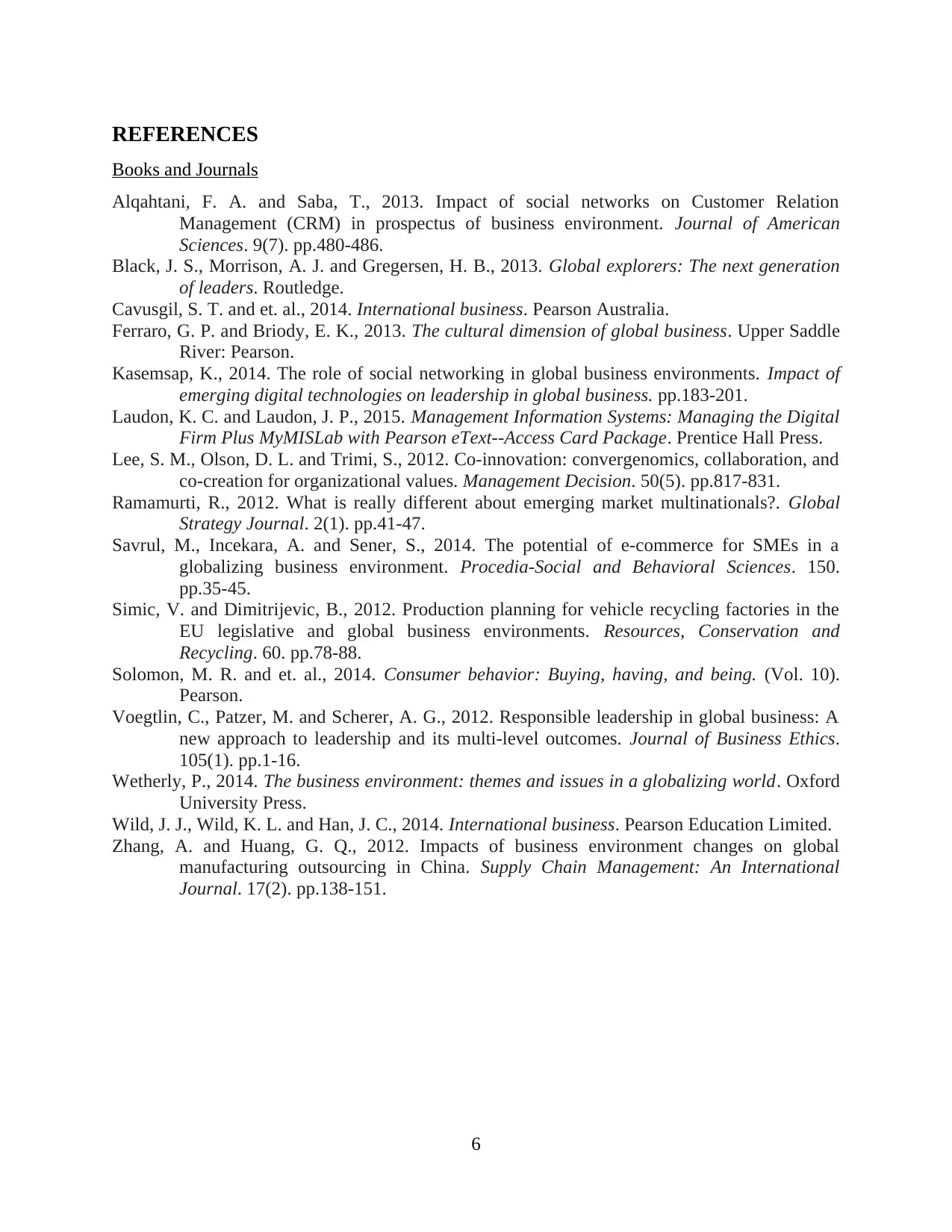
REFERENCES
Books and Journals
Alqahtani, F. A. and Saba, T., 2013. Impact of social networks on Customer Relation
Management (CRM) in prospectus of business environment. Journal of American
Sciences. 9(7). pp.480-486.
Black, J. S., Morrison, A. J. and Gregersen, H. B., 2013. Global explorers: The next generation
of leaders. Routledge.
Cavusgil, S. T. and et. al., 2014. International business. Pearson Australia.
Ferraro, G. P. and Briody, E. K., 2013. The cultural dimension of global business. Upper Saddle
River: Pearson.
Kasemsap, K., 2014. The role of social networking in global business environments. Impact of
emerging digital technologies on leadership in global business. pp.183-201.
Laudon, K. C. and Laudon, J. P., 2015. Management Information Systems: Managing the Digital
Firm Plus MyMISLab with Pearson eText--Access Card Package. Prentice Hall Press.
Lee, S. M., Olson, D. L. and Trimi, S., 2012. Co-innovation: convergenomics, collaboration, and
co-creation for organizational values. Management Decision. 50(5). pp.817-831.
Ramamurti, R., 2012. What is really different about emerging market multinationals?. Global
Strategy Journal. 2(1). pp.41-47.
Savrul, M., Incekara, A. and Sener, S., 2014. The potential of e-commerce for SMEs in a
globalizing business environment. Procedia-Social and Behavioral Sciences. 150.
pp.35-45.
Simic, V. and Dimitrijevic, B., 2012. Production planning for vehicle recycling factories in the
EU legislative and global business environments. Resources, Conservation and
Recycling. 60. pp.78-88.
Solomon, M. R. and et. al., 2014. Consumer behavior: Buying, having, and being. (Vol. 10).
Pearson.
Voegtlin, C., Patzer, M. and Scherer, A. G., 2012. Responsible leadership in global business: A
new approach to leadership and its multi-level outcomes. Journal of Business Ethics.
105(1). pp.1-16.
Wetherly, P., 2014. The business environment: themes and issues in a globalizing world. Oxford
University Press.
Wild, J. J., Wild, K. L. and Han, J. C., 2014. International business. Pearson Education Limited.
Zhang, A. and Huang, G. Q., 2012. Impacts of business environment changes on global
manufacturing outsourcing in China. Supply Chain Management: An International
Journal. 17(2). pp.138-151.
6
Books and Journals
Alqahtani, F. A. and Saba, T., 2013. Impact of social networks on Customer Relation
Management (CRM) in prospectus of business environment. Journal of American
Sciences. 9(7). pp.480-486.
Black, J. S., Morrison, A. J. and Gregersen, H. B., 2013. Global explorers: The next generation
of leaders. Routledge.
Cavusgil, S. T. and et. al., 2014. International business. Pearson Australia.
Ferraro, G. P. and Briody, E. K., 2013. The cultural dimension of global business. Upper Saddle
River: Pearson.
Kasemsap, K., 2014. The role of social networking in global business environments. Impact of
emerging digital technologies on leadership in global business. pp.183-201.
Laudon, K. C. and Laudon, J. P., 2015. Management Information Systems: Managing the Digital
Firm Plus MyMISLab with Pearson eText--Access Card Package. Prentice Hall Press.
Lee, S. M., Olson, D. L. and Trimi, S., 2012. Co-innovation: convergenomics, collaboration, and
co-creation for organizational values. Management Decision. 50(5). pp.817-831.
Ramamurti, R., 2012. What is really different about emerging market multinationals?. Global
Strategy Journal. 2(1). pp.41-47.
Savrul, M., Incekara, A. and Sener, S., 2014. The potential of e-commerce for SMEs in a
globalizing business environment. Procedia-Social and Behavioral Sciences. 150.
pp.35-45.
Simic, V. and Dimitrijevic, B., 2012. Production planning for vehicle recycling factories in the
EU legislative and global business environments. Resources, Conservation and
Recycling. 60. pp.78-88.
Solomon, M. R. and et. al., 2014. Consumer behavior: Buying, having, and being. (Vol. 10).
Pearson.
Voegtlin, C., Patzer, M. and Scherer, A. G., 2012. Responsible leadership in global business: A
new approach to leadership and its multi-level outcomes. Journal of Business Ethics.
105(1). pp.1-16.
Wetherly, P., 2014. The business environment: themes and issues in a globalizing world. Oxford
University Press.
Wild, J. J., Wild, K. L. and Han, J. C., 2014. International business. Pearson Education Limited.
Zhang, A. and Huang, G. Q., 2012. Impacts of business environment changes on global
manufacturing outsourcing in China. Supply Chain Management: An International
Journal. 17(2). pp.138-151.
6
⊘ This is a preview!⊘
Do you want full access?
Subscribe today to unlock all pages.

Trusted by 1+ million students worldwide
1 out of 9
Related Documents
Your All-in-One AI-Powered Toolkit for Academic Success.
+13062052269
info@desklib.com
Available 24*7 on WhatsApp / Email
![[object Object]](/_next/static/media/star-bottom.7253800d.svg)
Unlock your academic potential
Copyright © 2020–2026 A2Z Services. All Rights Reserved. Developed and managed by ZUCOL.




